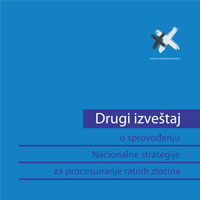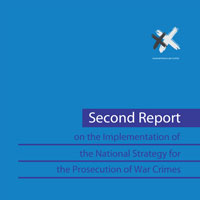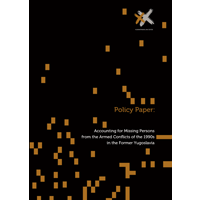(srpski) Zamagljivanje prošlosti – zajednički interes političke elite i ratnih profitera

Sorry, this entry is only available in srpski.


Sorry, this entry is only available in srpski.

Sorry, this entry is only available in srpski.


On Friday, July 27, 2018, the Humanitarian Law Center (HLC) presented its second Report on the Implementation of the National Strategy for War Crimes Prosecution. Opening the discussion on the report, Jelena Krstić from the HLC pointed to the fact that the problems that led to the adoption of the National Strategy for the Prosecution of War Crimes are still current: a small number of indictments, the lack of criteria for prioritising cases, a slowdown in trials, an inadequate witness and victims protection system, as well as inefficient regional cooperation. At the same time, the precondition Serbia needs to fulfill in order to join the European Union (EU) is to make visible progress in the prosecution of war crimes before domestic courts. Bearing in mind the current dynamics of the trials, Serbia risks losing a historical opportunity to prosecute as many war crimes perpetrators as possible. Namely, as time goes by, victims, witnesses and perpetrators are coming closer to the moment of death, and their memories are becoming more and more unstable; everyday socio-economic problems are taking precedence over concerns regarding events that occurred several decades ago, and the perspective of the future is becoming more and more important in relation to the need to solve the heritage of the past. Krstić concluded that for a more effective processing of war crimes the political determination of the institutions of Serbia is crucial, but that strong support and encouragement by the EU is also still needed.

Sorry, this entry is only available in srpski.

 The Humanitarian Law Center (HLC) has been monitoring and providing support to war crimes trials ever since the first war crimes proceedings conducted in Serbia in 2002. The HLC is the only organization that has been continuously monitoring and analysing war crimes trials in Serbia and informing the public at home and abroad about them. It has been representing victims (injured parties) in war crimes cases through an Attorney, filing criminal complaints with the Office of the War Crimes Prosecutors against suspected perpetrators, and sharing its documentation on war crimes. Also, the HLC has been identifying witnesses and victims and encouraging them to give evidence in court and thus contribute to achieving justice for past crimes.
The Humanitarian Law Center (HLC) has been monitoring and providing support to war crimes trials ever since the first war crimes proceedings conducted in Serbia in 2002. The HLC is the only organization that has been continuously monitoring and analysing war crimes trials in Serbia and informing the public at home and abroad about them. It has been representing victims (injured parties) in war crimes cases through an Attorney, filing criminal complaints with the Office of the War Crimes Prosecutors against suspected perpetrators, and sharing its documentation on war crimes. Also, the HLC has been identifying witnesses and victims and encouraging them to give evidence in court and thus contribute to achieving justice for past crimes.
The HLC has been monitoring the implementation of the National Strategy in order to offer its independent assessment of and findings on the state of implementation of the National Strategy. This is the second report on the implementation of the National Strategy that the HLC is presenting. For complete insight into the implementation of the National Strategy, the First Report on the Implementation of the National War Crimes Prosecution Strategy, which was presented by the HLC in December 2017, is also relevant.
As shown by the HLC’s findings, no progress in war crimes prosecutions can be reported for the two years since the adoption of the National Strategy. The implementation of the National Strategy has been severely delayed, and 11 of the 12 indictments that have been issued since the adoption of the National Strategy were not the result of the OWCP investigation but transferred to the OWCP from BiH. War crimes trials continue to be unnecessarily protracted, the procedural rights of victims have not been strengthened, the number of missing persons is decreasing at a slower pace than foreseen in the National Strategy, and the relevant international governmental and non-governmental organisations have negative opinions about Serbia’s progress in the prosecution of war crimes.
The Second Report on the Implementation of the National Strategy for the Prosecution of War Crimes is available here.

 The wars fought in the former Yugoslavia during the 1990s have left dire long-term consequences that the successor states of the former Yugoslavia will have to deal with for years to come. These states have yet to meet the challenge of dealing with systematic violations of human rights and of building democratic institutions, tasks that cannot be accomplished without taking a responsible approach towards dealing with the violent past. Such an approach is impossible without establishing the fate of the persons who are still unaccounted for as a result of the past armed conflicts.
The wars fought in the former Yugoslavia during the 1990s have left dire long-term consequences that the successor states of the former Yugoslavia will have to deal with for years to come. These states have yet to meet the challenge of dealing with systematic violations of human rights and of building democratic institutions, tasks that cannot be accomplished without taking a responsible approach towards dealing with the violent past. Such an approach is impossible without establishing the fate of the persons who are still unaccounted for as a result of the past armed conflicts.
The countries of the region still owe it to the families of 10,315 missing persons to conduct a thorough and impartial investigation into the circumstances surrounding the killing or disappearance of their loved ones, and to punish those found responsible in a manner proportionate to the gravity of their crimes. Serbia’s legislative framework does not recognise the families of missing persons as civilian victims of war, as a result of which the domestic reparation system is flawed and discriminatory.
The search for missing persons is a difficult process which is dependent on the political situation in a given state in the region. Although there is a need to know the truth regarding the fate and whereabouts of persons gone missing during the armed conflicts – a need which is expressed primarily by their family members and included sporadically on the meeting agendas of statesmen in the region – in reality, the search process is hampered by many factors, such as the insufficient capacities and inadequate financial resources of the government bodies involved in tracing missing persons, and the absence of political will and of determination to enhance regional cooperation in order to make the search process more efficient and effective.
This policy paper provides an overview of the results achieved so far in addressing the missing person issue, identifies the challenges in the search for persons disappeared during the armed conflicts in the former Yugoslavia of the 1990s, and proposes a set of recommendations which may help make the search process more efficient.
Policy Paper: Accounting for Missing Persons from the Armed Conflicts of the 1990s in the Former Yugoslavia available here.

Sorry, this entry is only available in srpski.

Sorry, this entry is only available in srpski.

Sorry, this entry is only available in srpski.